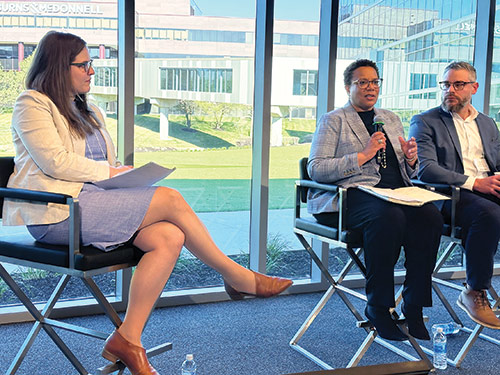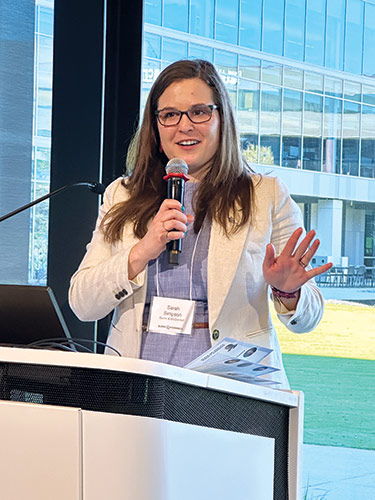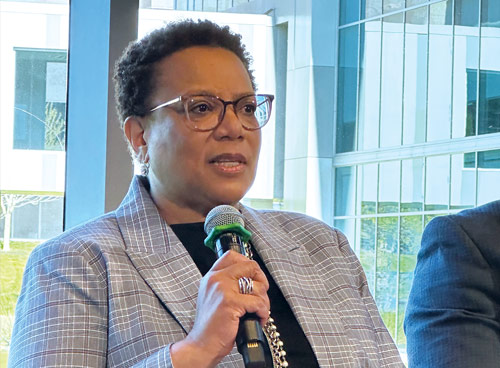Unique conversations
Stephanie Hickman is the CEO of Trice Construction.


The "Equity in Energy" event adopted its keynote address' title "Beyond Ordinary" as its theme. A panel discussion among four diverse subcontractor leaders was inspiring as well. The CEO of Trice Construction, the Presidents of APC Construction and EVS, and the Business Development Director of Blaze Contracting all brought unique perspectives on how they and similar companies nationwide can take on increasing roles in the energy transformation.
PUF's Steve Mitnick: What's the secret sauce of Trice Construction?
Stephanie Hickman: The secret sauce of Trice Construction is our industry experience. I'm coming up on thirty years in the industry and on the construction side for the last seventeen.
I started my utilities career with Duquesne Light Company in Pittsburgh, and I was also at ComEd. I knew the industry, and there was a point when my family's construction business was looking to wind down. I'm second generation in the family's now fifty-seven-year-old business.
I saw an opportunity where a lot of infrastructure projects were coming online while my uncles in the business were ready to retire. I thought there was a good intersection of my experience in the industry and my family's legacy in construction to pull that together.
We've been able to do that. That's one of the secret sauces is coming as a utility industry insider into a construction business that's now multiple generations.
PUF: What's one or two jobs you have done for utilities, as a contractor or subcontractor, that you're proud of, was fun, and you like to mention?
Stephanie Hickman: We've participated in several grid modernization programs, in particular a project with Ameren Missouri. For multiple years we were rebuilding manholes.
It doesn't sound super sexy, but it's a necessity, and we were the civil contractor on the rebuild of about four hundred manholes in and around St. Louis as they were upgrading the infrastructure. That's one we're proud of because you could drive around and say, "We worked in this intersection, we were on this corner."
We've also been doing other underground distribution work with Ameren Missouri running conduits. We had our first big one run right past Busch Stadium, and we were competing with opening day for the Cardinals baseball team (Cardinals beat the Red Sox 11-6).
We had a tough schedule, and were able to manage that, building good relationships and communications with Ameren and the Cardinals to get that done in a timely way.
PUF: What's a typical day as CEO like for you?
Stephanie Hickman: There's no such thing as a typical day. In addition to being president, and CEO, I'm the CRO, which is the chief risk officer. Also, the chief relationship officer.
I spend a lot of my time focused around, are we identifying, managing, and mitigating risk? Then are we building the right relationships? All the issues that fall within those categories are important.
Sometimes I'm doing a little troubleshooting, some firefighting, and sometimes I'm dealing with suppliers. But most often, I try to prioritize my time around, is it driving the business strategy forward in terms of how we're supporting our customers and how we're building the business and the culture?
PUF: This conference has a focus on diversity through workforce, but also on suppliers to the energy industry. Why is this topic important?
Stephanie Hickman: As an African-American woman-owned business, we have a direct interest in how to build our business in a way that serves the customers �" in this case the utilities �" that is representative of the customers they serve, and that builds communities. The opportunity to grow our business means we're hiring more people.
When you hire people from underserved communities, you provide economic impact. We talk to a lot of people that we hire and say, "What you're really doing is committing an act of economic empowerment."
When investing in training or other development opportunities to gain access to this industry of ours, we know how much work is coming, and the challenges around the workforce. Anytime we can combine serving the customer and community, building, and helping families grow economically, that's important to us. That's where I get really happy.
PUF: You're working with Ameren Missouri, Peoples Gas, and American Water. Why is it good for them to be working with your company and minority firms generally?
Stephanie Hickman: It's important for the utilities to look at smaller firms because we can deliver. Sometimes, we're a little more agile. And diverse firms hire more diverse people.
I talked about the event here and how complex this organization can be at Burns & McDonnell. It's important for them to see how they can help grow their communities, create opportunities, give people a shot, give them a chance, and know that working with a big company is a huge undertaking.
I worked for ComEd for years, and what I realized in retrospect, those first few years I was knocking on the door, but we weren't ready. We weren't ready to work with a company of that size where my family business was coming from, and we had to gain some experience to do that.
Engaging small businesses, educating small businesses, sponsoring, encouraging, mentoring, and development. I see across our customer base, opportunities to develop the business to grow scale.
Because not all of us, but many of us, like Trice, were figuring out how to scale the business in a way that we can serve more. From being a little closer to the communities, it is important as a stakeholder to share our perspectives internally, that may be able to then impact and influence.
I can go to state capitals and share, from our experience, this is what happens when smaller, mid-market companies have access to opportunities. This is what this means, what happens when you make a certain decision, how that flows through utilities to diverse suppliers, and how they can have an impact.
'Equity in Energy' articles at fortnightly.com:
- Tremese Davis, Nicor Gas VP of Operations and Taiwan Brown, Entergy VP of Diversity and Workforce Strategies
- Cornell Johnson, Center for Energy Workforce Development Director of DEI
- Keith Porta, APC Construction President
- Gayl Turk, Blaze Contracting Director of Business Development
- Stephanie Hickman, Trice Construction CEO
- Andy Kim, EVS Engineering President
Category (Actual):
Department:
